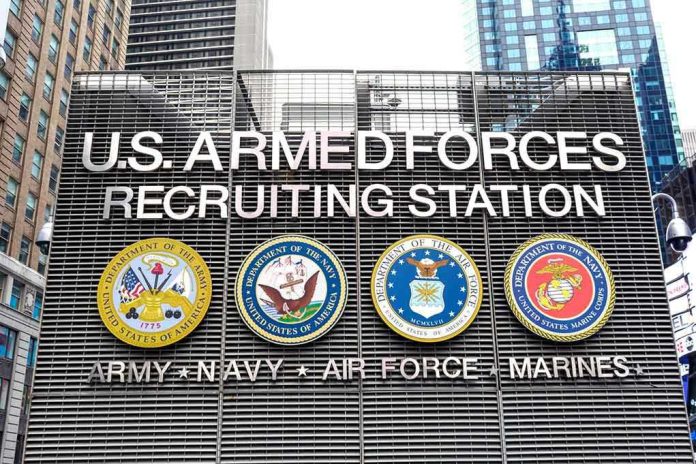
One senator’s name now stands for a shutdown that’s left America’s military in limbo—if you think politics can’t threaten national security, think again.
Story Snapshot
- Pete Hegseth pins the blame for the government shutdown—and its fallout for the military—squarely on Senate Majority Leader Chuck Schumer, dubbing it the “Chuck Schumer special.”
- The Department of Defense faces halted pay, stalled training, and shaken morale as budget talks grind to a halt in Congress.
- Political brinkmanship over government funding has once again put America’s defense at the center of a partisan storm.
- Critics warn these shutdowns erode public trust and compromise military readiness, with no clear end in sight.
Hegseth’s Accusation: The “Chuck Schumer Special” Hits the Pentagon
Pete Hegseth didn’t mince his words. Appearing on national television, he directed public ire at Senate Democrats—specifically Majority Leader Chuck Schumer—for what he labeled the “Chuck Schumer special.” Hegseth’s criticism came as Congress failed to pass a funding bill, triggering a government shutdown that immediately disrupted the Department of Defense. He argued that this wasn’t just political gamesmanship; it was a direct hit to national security, with real consequences for military pay, training, and operational readiness. Schumer, he charged, put political optics ahead of military needs, leveraging the Pentagon’s budget as a bargaining chip to appease his party’s base.
Hegseth’s rhetorical approach—naming the impasse after Schumer—was not just about assigning blame. It was about framing the shutdown as an act of political will, not necessity. In his view, the “Chuck Schumer special” personalized the pain, making it clear to conservative viewers who he believed was responsible for the disruption now rippling through the armed forces and their families.
How Budget Battles Became a National Security Threat
Government shutdowns have become a recurring feature of American politics, each one revealing the vulnerabilities of essential agencies. The Department of Defense, often mythologized as untouchable, is not immune. In this latest standoff, the Pentagon’s operations, from payroll to training exercises, have ground to a halt. Service members and civilian employees now face uncertainty about their next paycheck, while military leaders scramble to maintain morale amid the chaos. The timing could not be worse: global security concerns are mounting, and America’s adversaries are watching. Hegseth and like-minded critics argue that these funding lapses do not just send a message of dysfunction to the American public—they broadcast instability to the world.
Hegseth blasts Democrats for hitting War Department with 'Chuck Schumer special' https://t.co/g9GQIvms0k #FoxNews
— Beautiful Town (@sctnglobal) October 6, 2025
Schumer and Senate Democrats, for their part, defend their stance as a principled fight for responsible budgeting and policy priorities. They point to a history of budget negotiations marred by intransigence on both sides, arguing that the current impasse reflects a broader partisan struggle over spending and values. Republican leaders, including John Thune, use the moment to highlight what they see as reckless Democratic overreach. The power struggle is as much about narrative as it is about numbers: who will the public blame, and who will emerge as the defender of American interests?
Collateral Damage: Military Readiness and Public Trust
The immediate effects of the shutdown are tangible—delayed paychecks, paused training, and contractors left in limbo. For military families, the financial strain compounds a sense of being pawns in a political chess match. Defense contractors, reliant on timely payments for ongoing projects, brace for disruption. The longer-term implications are more insidious. Each shutdown chips away at public trust in government and, according to defense analysts, undermines recruitment and retention within the armed forces. The precedent is troubling: as shutdowns become a tool of negotiation, the military’s operational reliability becomes collateral damage in partisan battles.
Expert voices across the spectrum warn that this cycle of brinkmanship is unsustainable. Defense officials echo Hegseth’s warnings, noting that repeated shutdowns signal weakness to adversaries abroad. Political scientists argue that both parties, by normalizing shutdowns as a bargaining tool, share responsibility for the consequences. Yet Hegseth’s framing—that Schumer owns this shutdown, and its impact on America’s military—continues to resonate in conservative media and among voters demanding accountability.
What Comes Next: Negotiations, Narratives, and the Waiting Game
As Congress continues its high-stakes negotiations, the Pentagon remains in a holding pattern. Hegseth’s critique, amplified in conservative circles, pressures Democratic leadership to resolve the impasse or risk further eroding public confidence. Schumer and his allies counter with calls for bipartisan compromise, but with each passing day, the costs to military readiness and morale mount.
The standoff’s resolution remains uncertain. What is clear is that the Department of Defense, once considered sacrosanct in budget debates, is now a bargaining chip—its fate tethered to the fortunes of political leaders more focused on narrative than on national security. As the shutdown drags on, one question lingers: will America’s military become a perennial hostage to partisan politics, or will leaders find a way to put readiness above rhetoric?
Sources:
Fox News: ‘Dealing with a Chuck Schumer special’
Town & Country Today: Hegseth declares an end to ‘politically correct leadership’ in the US military



